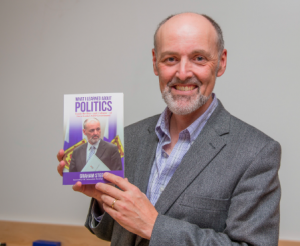
Former NDP minister speaks at Dal about new tell-all book
“Politics can sometimes feel like a bad movie on a loop,” joked Graham Steele during a talk about his new book on Oct. 8.
“Nobody learns anything from each other. In order to break that cycle we have to let people know how [politics] really works.”
Steele, the former finance minister for the NDP party of Nova Scotia, released his book, *What I Learned About Politics: Inside the Rise — and Collapse – of Nova Scotia’s NDP Government*, last month. In the short time since its release, Steele’s book has already made the Globe and Mail bestseller list.
The book recounts Steele’s 15-year career as a politician, from his stint as a critic for finance in the opposition to his time as a cabinet minister.
“I feel like an anthropologist,” said Steele. “I’ve been to the kingdom of political apes and I’ve come back to tell the story.”
Steele left politics in 2012, when he resigned from his position as a cabinet minister. He says there were many reasons he left the job, but the most controversial was his disagreement with then-premier Darrell Dexter’s decision to agree to a contract with the Nova Scotia Government & General Employees Union.
This was a contract that Steele didn’t believe the province could afford.
After the decision was made, Steele wrote, “I knew my time in cabinet was over. All that was left was to work out the details.”
Unlike many memoirs by former politicians, political junkies weren’t the target audience that Steele had in mind while writing his book.
“Fundamentally, government belongs to the people. Yet decisions were coming out of government and people had no idea how they were made. It’s important in a healthy democracy to know how government works,” he said.
But Steele maintains that politics is not for the faint of heart. He believes politics has a culture of “amateurism,” where “starry-eyed go getters get into office and think they can change the world.” His simple answer: you can’t.
Steele says political culture is something that cannot be taught, but rather something you adapt to in time. He maintains that an educational background is important prior to entering politics, but likens it to “studying apes in the classroom, but there’s nothing quite like studying them in their natural habitat.”
When a student asked Steele what he would say to the younger generation entering politics, he said, “this is going to sound like a joke, but it’s not. Read my book.” Most of his book, Steele says, is information and insight that he wished he knew when he first ventured into politics.
“The important thing in what I’m trying to do with the book is help people to understand how politics works,” said Steele, “so when they get into it they are much better armed than I was.”
Although Steele ended on a positive note, some students who attended the discussion felt his tone on politics was negative.
Charlotte Julian, a fourth-year Political Science and International Development Studies student, says she was surprised by how Steele felt towards the Nova Scotia government.
“I always had this opinion about politicians and how they have a particular persona in government,” she says. “But the fact that he was in politics and has such a negative view [on government] makes me feel even more negative about it.”







